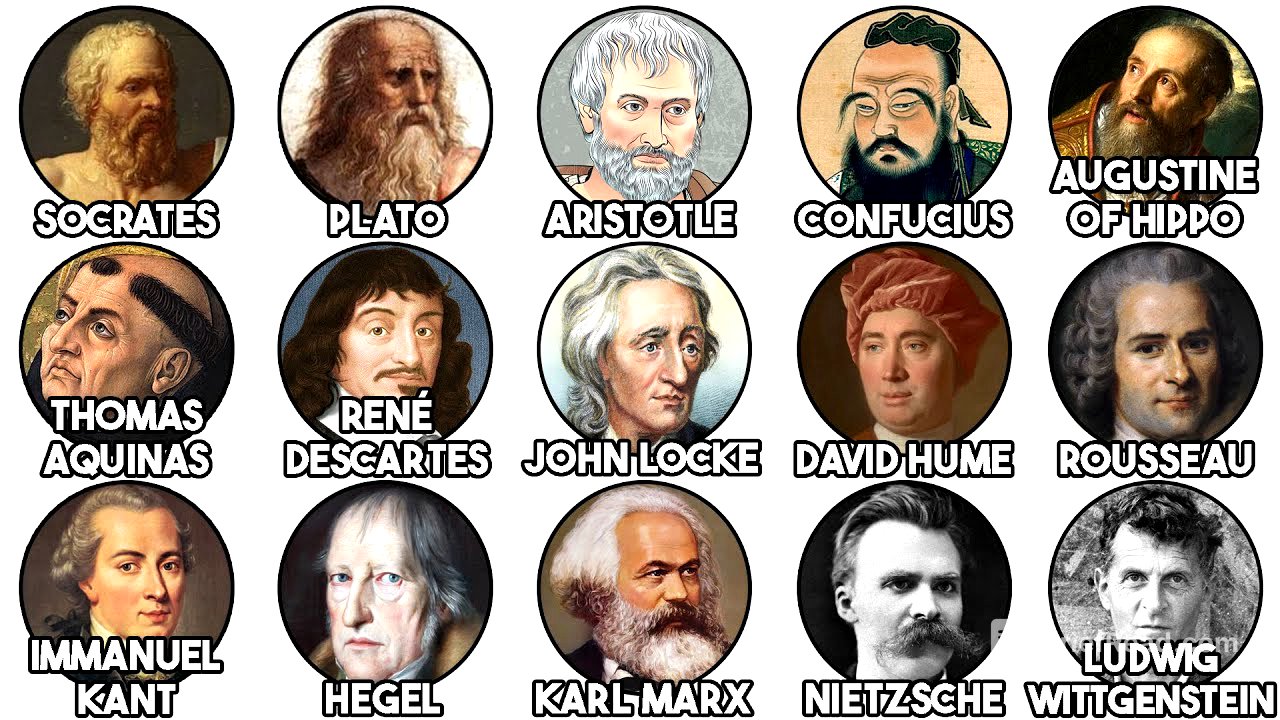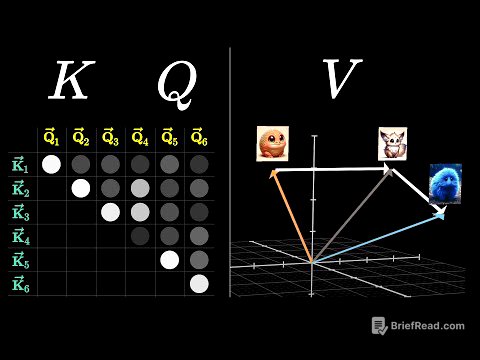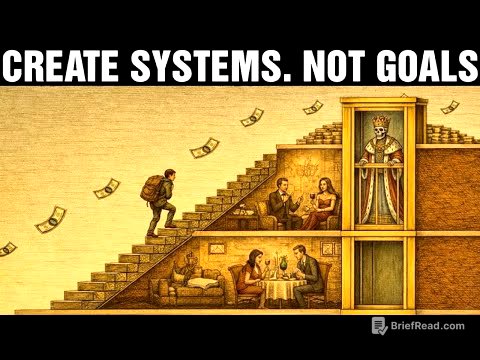TLDR;
Alright, so this video gives a quick rundown of some major figures in Western philosophy, plus Confucius. It starts with Socrates and goes through folks like Plato, Aristotle, Augustine, Aquinas, Descartes, Locke, Hume, Rousseau, Kant, Hegel, Marx, Nietzsche, and Wittgenstein. Each philosopher's got their key ideas and how they influenced the world explained in simple terms.
- Socrates: Socratic method, ethics, "unexamined life"
- Plato: Theory of Forms, "The Republic"
- Aristotle: Logic, ethics, science
- Confucius: Virtues, social harmony
- Augustine: Original sin, grace
- Aquinas: Faith and reason, five ways
- Descartes: "I think, therefore I am," dualism
- Locke: Empiricism, natural rights
- Hume: Skepticism, empiricism
- Rousseau: Social contract, general will
- Kant: Categorical imperative, reason
- Hegel: Dialectic, history
- Marx: Class struggle, communism
- Nietzsche: God is dead, Superman
- Wittgenstein: Language games, meaning
Socrates [0:00]
Socrates, born in Athens around 469 BC, was a big name in Western philosophy. He was all about ethics, knowledge, and using dialogue to get to the truth. He didn't write anything himself, but his student Plato wrote down a lot of his ideas. Socrates believed that being virtuous was super important for a good life, and he famously said, "The unexamined life is not worth living." He questioned everyone's beliefs, which made him both popular and unpopular. In 399 BC, he was put on trial and executed for corrupting the youth, but he stuck to his principles until the end, becoming a martyr for free thought.
Plato [1:33]
Plato, who was Socrates' student and Aristotle's teacher, was born in Athens around 428 or 427 BC. He came from a rich family and got a good education. He founded the Academy in Athens, which was like one of the first universities. Plato wrote a lot of dialogues, with Socrates as the main character, talking about ethics, politics, and all sorts of things. One of his most famous works is "The Republic," where he talks about a perfect society ruled by philosopher kings. Plato believed in reason and that the real world is just a shadow of a higher reality. He died around 347 BC, but his ideas have been shaping Western thought for over 2,000 years.
Aristotle [3:06]
Aristotle, born in 384 BC in Greece, was another major philosopher who influenced everything from science to ethics. He studied at Plato's Academy for 20 years but eventually went his own way, focusing on observing the world around him. He even tutored Alexander the Great. Aristotle founded the Lyceum in Athens, where he taught and did research on all sorts of subjects. He believed in reason, moderation, and practical wisdom. He came up with the idea of the "golden mean," which is all about finding balance in life. Aristotle died in 322 BC, leaving behind a huge impact on philosophy and science.
Confucius [4:57]
Confucius, born in China in 551 BC, was a philosopher whose teachings shaped East Asia. He grew up poor but loved learning. He became a teacher and taught his students about ethics and good governance. His philosophy was all about being virtuous, having moral integrity, and getting along with others. He emphasized five key virtues: benevolence, righteousness, propriety, wisdom, and faithfulness. Confucius believed that education could change people and that rulers should lead by example. His teachings were written down in the "Analects" after he died in 479 BC. Confucianism became the state philosophy of China and continues to influence East Asia today.
Augustine [6:43]
Augustine of Hippo, born in North Africa in 354 AD, was an early Christian philosopher who had a big impact on Western Christianity. He was a smart but rebellious youth, exploring different philosophies before converting to Christianity. He became the bishop of Hippo and wrote famous works like "Confessions" and "The City of God." Augustine believed that humans are naturally sinful and need God's grace to be saved. He combined Christian ideas with classical philosophy, shaping medieval thought. Augustine died in 430 AD, but his ideas continue to be influential in Christian theology.
Aquinas [8:34]
Thomas Aquinas, born in Italy in 1225, was a Dominican monk and theologian who mixed faith and reason. He came from a noble family, but he chose to join the Dominican order, which valued poverty. He studied under Albertus Magnus and became a big fan of Aristotle's philosophy. Aquinas wrote the "Summa Theologica," which combined Christian teachings with Aristotelian ideas. He's famous for his "five ways" of proving God's existence. Aquinas believed that faith and reason go hand in hand. His ideas shaped Catholic doctrine and continue to be important in discussions about religion and science.
Descartes [10:22]
Rene Descartes, born in France in 1596, was a philosopher, mathematician, and scientist. He's often called the father of modern philosophy. He came from a wealthy family and got a good education. Descartes traveled around Europe and developed groundbreaking philosophical ideas. He's famous for saying, "I think, therefore I am," which established self-awareness as the first certainty. Descartes believed in rationalism, that reason and math are key to understanding the world. He also came up with Cartesian dualism, the idea that the mind and body are separate. His work in math and science was also super important. Descartes died in 1650, but his ideas shaped the Enlightenment and modern science.
Locke [12:12]
John Locke, born in England in 1632, was an English philosopher whose ideas about government and individual rights had a big impact. He grew up in a Puritan household and got a good education. Locke believed in empiricism, that the mind is a blank slate at birth and knowledge comes from experience. He also believed in natural rights, like life, liberty, and property. Locke argued that governments should get their power from the people they govern. His ideas influenced the American and French Revolutions and continue to shape modern liberalism.
Hume [13:49]
David Hume, born in Scotland in 1711, was a Scottish philosopher, historian, and economist. He's known for his empiricism and skepticism. Hume believed that knowledge comes from experience and questioned traditional philosophical ideas. He introduced the problem of induction, questioning whether we can assume the future will be like the past. His views on religion were controversial, earning him a reputation as an atheist. Hume's philosophy influenced later thinkers like Immanuel Kant and continues to shape modern thought.
Rousseau [15:24]
Jean-Jacques Rousseau, born in Switzerland in 1712, was a philosopher, writer, and composer. His ideas influenced the Enlightenment and the French Revolution. Rousseau believed that humans are naturally good but corrupted by society. In "The Social Contract," he introduced the idea of the "general will" and that government should come from an agreement among free individuals. He also wrote about education, emphasizing natural development and freedom. Rousseau's ideas had a big impact on the French Revolution and continue to be important in political philosophy.
Kant [17:22]
Immanuel Kant, born in Germany in 1724, is considered one of the most influential figures in Western philosophy. He tried to bridge the gap between rationalism and empiricism, arguing that knowledge comes from experience but is shaped by the mind. He introduced the "categorical imperative," a key part of his moral philosophy, which says that actions should be based on principles that can be applied to everyone. Kant's work shaped metaphysics, ethics, and aesthetics, influencing later philosophers like Hegel and Marx.
Hegel [18:57]
Georg Wilhelm Friedrich Hegel, born in Germany in 1770, was a German philosopher whose ideas influenced modern thought, especially in philosophy and history. Hegel's philosophy is based on the idea of the "dialectic," a process of development through contradictions. He believed that history unfolds through this process, driven by a "world spirit." Hegel's ideas about freedom and the state were also important, arguing that individual freedom is realized within the framework of ethical life and the state.
Marx [20:34]
Karl Marx, born in Germany in 1818, was a philosopher, economist, historian, and revolutionary. His ideas shaped modern political thought and inspired movements worldwide. Marx developed a critical view of society, focusing on class struggle and the conditions of the working class. He co-wrote "The Communist Manifesto" and wrote "Das Kapital," introducing concepts like historical materialism and the critique of capitalism. Marx argued that the working class would overthrow the ruling class, leading to a classless society. His ideas laid the foundation for Marxism and continue to influence discussions on inequality and labor rights.
Nietzsche [22:22]
Friedrich Nietzsche, born in Germany in 1844, was a philosopher, poet, and cultural critic. His ideas challenged the foundations of Western thought. A key concept in his philosophy is the "Übermensch," or Superman, an individual who creates their own values. He famously declared "God is dead," criticizing religion and traditional morality. Nietzsche also explored nihilism and the "will to power." His ideas influenced existentialism, postmodernism, and psychology.
Wittgenstein [24:08]
Ludwig Wittgenstein, born in Austria in 1889, was a philosopher who influenced 20th-century philosophy, especially in logic and language. His early work, "Tractatus Logico-Philosophicus," proposed a picture theory of language. Later, he revised his views, exploring language as a social activity governed by "language games." He argued that the meaning of words is determined by their use in specific contexts. Wittgenstein's ideas reshaped analytical philosophy, influencing linguistics and cognitive science.








![Python for Beginners – Full Course [Programming Tutorial]](https://wm-img.halpindev.com/p-briefread_c-10_b-10/urlb/aHR0cDovL2ltZy55b3V0dWJlLmNvbS92aS9lV1JmaFpVenJBYy9ocWRlZmF1bHQuanBn.jpg)